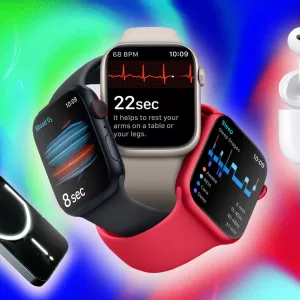
Introduction to High-End Meditation Apps
Meditation has increasingly become a part of the daily routine for many individuals seeking a sense of calm, better sleep, and improved mental health. With the rise of mobile technology, meditation apps have soared in popularity, offering users easy and on-the-go access to meditation sessions. Among these, Headspace has emerged as a leading application in the digital wellness space.
Overview of Meditation Apps and Their Rising Popularity
– **Increasing Awareness:** In recent years, there’s been a surge in awareness around the benefits of meditation, including stress relief, enhanced focus, and increased emotional well-being.
– **Accessibility and Convenience:** Meditation apps offer unparalleled convenience, allowing users to engage in practices anytime and anywhere, which has significantly contributed to their widespread use.
– **Personalization:** These apps typically offer a variety of programs, enabling users to choose sessions that cater to their personal objectives, whether it be better sleep, anxiety management, or mindfulness techniques.
– **Community and Guidance:** Many users find the structured guidance provided by apps like Headspace reassuring and effective for establishing a consistent meditation practice. The sense of community can also be motivating.
The Importance of Quality in Meditation Apps
– **Expertise:** High-quality meditation apps are usually developed with the input of experienced practitioners and mental health experts, ensuring that the meditations are beneficial and safe.
– **Design and User Experience:** A well-designed meditation app with a user-friendly interface encourages regular use and helps users navigate through different features and sessions without feeling overwhelmed.
– **Content Variety:** Apps that offer a wide range of sessions address various aspects of mental and physical health, catering to the diverse needs and preferences of users.
– **Tracking Progress:** Features that allow users to track their progress can be highly motivational and assist in developing a consistent meditation practice.
– **Continuous Updates:** The best meditation apps regularly update content and features to keep the practice engaging and to incorporate the latest in meditation and psychological research.
Headspace, as a leading meditation app, epitomizes these qualities. Its efforts to make meditation simple and accessible have resonated with millions of users worldwide. By maintaining a focus on quality, offering a variety of guided sessions, and creating a friendly platform, Headspace has become a go-to choice for individuals looking to improve their mindfulness and overall well-being. As people continue to seek out tools for mental health support, meditation apps with robust features and well-crafted content will likely remain popular fixtures in the digital wellness landscape.
The Science Behind Meditation Apps and Mental Health
Examining the Research: How Apps Influence Mental Well-being
Meditation apps have exploded in popularity in recent years, and scientists have taken note, conducting studies to evaluate their impact on mental health. These are some of the findings:
– **Accessibility**: These apps put mindfulness practices within reach for people who may not have access to in-person meditation sessions due to logistical or financial constraints.
– **Consistency**: With reminders and various programs, users are encouraged to meditate regularly, which is found to be crucial for maintaining the benefits of meditation.
– **Variety**: Different meditation practices are available to address specific mental health aspects, such as anxiety, depression, and stress management.
– **Self-Paced Learning**: Users can progress at their own pace, an essential factor in building a sustainable practice.
– **Cognitive Benefits**: Numerous studies have shown that regular use of meditation apps can lead to improved focus, clarity of thought, and cognitive flexibility.
– **Stress and Anxiety Reduction**: Meditation apps are efficacious in reducing symptoms of stress and anxiety, as evidenced by reported decreases in cortisol levels among users.
Linking Meditation Apps to Improved Mood and Emotional Reactivity
The correlation between meditation app use and enhanced emotional well-being has been substantiated through various research endeavors. Here’s what has been discovered:
– **Emotional Regulation**: Regular engagement with meditation apps aids in developing better emotional regulation skills, making it easier for individuals to manage their emotional responses.
– **Mindfulness**: Apps foster an increased state of mindfulness, which helps in reducing ruminative thought patterns that are frequently associated with depression.
– **Positive Mood**: Users often report improved mood and general happiness, underpinned by the practice of mindfulness and meditation.
– **Sleep Quality**: Guided meditations designed for sleep improve sleep patterns, leading to better mood regulation.
– **Relationships**: Mindfulness and meditation have shown positive effects on interpersonal dynamics, often enhancing compassion and empathy.
To encapsulate, meditation apps like Aura Health App, Headspace, and others are not mere digital tools but effective instruments for enhancing mental health and well-being. The factual data weave together to present these apps as conduits of mental harmony, contributing significantly to our daily mental health regimen. By integrating these digital aides into our lives, we pave the way for a more mindful, serene, and emotionally resilient existence.
Features that Define High-End Meditation Apps
Personalization and Its Role in Effective Meditation Practice
When I consider the myriads of meditation apps available, personalization stands out as a feature pivotal to an effective meditation practice. As a user with specific preferences and goals, personalization becomes crucial in tailoring the experience to my needs. Here are the factors I look at:
– **User Experience**: I prefer apps that allow me to customize my meditation journey, such as changing session lengths or selecting specific themes or areas of focus that resonate with me.
– **Guided Meditations**: The voice and style of guided meditations are personal choices. I like when I have options to choose from so that the guidance feels more relatable and soothing.
– **Adaptive Learning**: High-quality meditation apps often suggest content based on my previous sessions. This makes me feel understood and keeps my practice engaging.
– **Language Options**: Being able to choose the language of the meditation guides is a big plus for comprehension and comfort.
Therapeutic Areas Addressed: Some apps offer sessions targeting particular concerns, such as anxiety or pain management. This sort of specialization can greatly enhance the effectiveness of the meditation for those suffering from these conditions.
A key app that stands out in personalization is Headspace. It offers a range of guided meditations for different scenarios, making it easy for me to find what I’m in the mood for. Whether I’m seeking to alleviate stress or enhance my focus, Headspace seems to have a personalized solution for me.
Tracking Progress and Goals: The Key to Consistent Mindfulness
Another feature I value is the ability to track progress and goals, as it reinforces my motivation and helps maintain a consistent practice. Considerations for tracking features include:
– **Session History**: I prefer apps that log my session history, providing me with a clear view of my consistency and dedication to the practice.
– **Milestones**: Knowing that I’ve reached a milestone, such as meditating for a certain number of days in a row, gives me a sense of accomplishment.
– **Statistical Feedback**: Detailed statistics such as time spent meditating and frequency of sessions help me understand my habits better.
– **Reminder Notifications**: Apps that send me reminders encourage me to stay on track with my meditation goals, especially during busy times.
Meditation apps with robust tracking features, such as Calm, have helped me stay accountable. By showing my daily streaks and time spent meditating, I’m more driven to keep the streak going and to carve time out of my day for mindfulness. It fosters a satisfying sense of progression and commitment within my meditation practice.
In conclusion, while evaluating meditation apps, the available features play a significant role in my decision-making process. Features like personalization and progress tracking are more than just conveniences—they are essential components that enhance my meditation experience, encourage consistency, and support my mental health journey.
The Role of Guided Sessions in Meditation Apps
Understanding the Benefit of Professional Guidance
As I delve into the world of meditation through the use of apps, the variety of techniques available—like mindfulness, body scan, and more niche practices—is impressive. Each method serves a unique purpose, catering to different aspects of my mental and spiritual wellbeing. One standout feature in many of these apps is the inclusion of guided sessions, which have been a cornerstone of my meditation journey, especially as I was starting out.
– **Step-by-Step Instruction**: In my experience, the step-by-step guidance provided in these sessions eliminates the guesswork that often accompanies meditation. As a beginner, I found it challenging to know if I was “doing it right,” but the professional instructions laid out a clear path for me to follow.
– **Diverse Practices**: The wide range of practices led by seasoned meditation instructors means I’m never bored. Whether I’m looking for a quick session to refocus my mind during a busy day or a more in-depth practice to explore the depths of my consciousness, I have options at my fingertips.
– **Personal Development**: It’s incredible how some guided meditations have instigated moments of personal insight and development. With a knowledgeable guide, I’ve been introduced to techniques that foster self-inquiry and growth.
Prompted by the voice of an experienced teacher, I’ve learned how to navigate my inner landscape with greater confidence and clarity. The result is a meditation practice that feels both personal and supported, bridging the gap between solitary practice and the benefits of a meditation community.
Maintaining Motivation: How Guided Sessions Encourage Consistency
One of the most significant challenges I faced early in my meditation practice was maintaining consistent motivation. Life gets busy, and without a structured approach, it’s easy for the practice to fall by the wayside. This is where guided sessions within meditation apps shine.
– **Structured Programs**: Many apps offer structured programs that create a sense of progression. By following a set trajectory, I’m motivated to see what comes next, just like episodes in a series.
– **Reminders and Notifications**: Push notifications from meditation apps serve as gentle nudges to take time for myself. These remind me of the commitment I’ve made to my wellbeing.
– **Progress Tracking**: I’ve found it fulfilling to view my meditation stats—seeing the number of days I’ve meditated in a row or the total time spent in practice reminds me of my dedication and the effort I’ve put into my mental health.
– **Community**: Some apps connect me with a community of fellow meditators, adding a layer of social motivation. Knowing there are others on this journey with me makes me less likely to skip a session.
The combination of expert guidance, structured programs, and motivational tools works in harmony to keep me engaged and committed to my practice. Whether it’s progressing through a 10-day beginner’s course or delving into a themed meditation series, guided sessions have been instrumental in making meditation a non-negotiable part of my daily routine.
Top-Rated Meditation Apps of 2023
Breaking Down the Best Meditation Apps on the Market
With numerous meditation applications available, pinpointing the ones that truly stand out is essential for committing to a practice that fits seamlessly into my lifestyle. After thorough exploration and consistent use, I’ve gathered that the top contenders this year are known for their high-quality content, user-friendly interfaces, and diverse range of features that cater to users at both beginner and advanced levels. Below are the apps that have resonated most with me:
– **Headspace**: Undoubtedly, Headspace has earned its top spot in my rankings. It’s not just the variety of meditation sessions that make it appealing, but also the added focus on educating users about mindfulness in daily life.
– **Calm**: Another favorite of mine, Calm provides not only guided meditations but also Sleep Stories, which have a remarkably soothing effect and have greatly improved my bedtime routine.
– **Insight Timer**: Boasting a massive library of free content, Insight Timer allows me to explore different meditation styles and teachers, which keeps my practice fresh and engaging.
– **10% Happier**: Based on the bestselling book, this app emphasizes practicality and demystifies meditation, making it approachable for skeptics or those who prefer a no-frills approach.
– **Buddhify**: With its unique wheel interface, Buddhify offers targeted sessions for various parts of my day. It’s perfect for on-the-go meditation, suiting my sometimes hectic schedule.
Each app shines in its own way, but they all share a commitment to improving mental well-being through meditation and mindfulness.
What Sets These High-End Apps Apart from the Competition
The distinction of these top-tier meditation apps lies not only in the quality of their meditation content but in how they engage users to ensure long-term practice and personal growth:
– **Expertly Crafted Sessions**: Renowned meditation teachers and experts design each session with care, assuring that I receive the highest quality guidance.
– **Customizable Experiences**: Personalization features allow me to tailor meditation sessions to my mood, goals, and available time, creating a practice that feels genuinely mine.
– **Resource Libraries**: Beyond the meditation sessions themselves, these apps offer extensive libraries of resources on mindfulness, sleep, and stress management, providing comprehensive support for my overall well-being.
– **User-Centric Design**: Clean, intuitive interfaces across these platforms make navigation simple, encouraging me to immerse in my meditation practice without technical distractions.
– **Supportive Community Features**: Features that connect users with each other, such as discussion groups or community challenges, enhance my commitment by invoking a sense of shared purpose and camaraderie.
In summary, the best meditation apps of 2023 distinguish themselves by delivering a holistic experience that goes beyond simple relaxation techniques. They educate, engage, and support me on my journey toward greater peace and mindfulness, proving their value in today’s fast-paced world.
User Experience and Interface Design in Meditation Apps
The Impact of User-Friendly Design on Meditative Practices
Meditation apps have become essential tools that help people like me incorporate mindfulness into our daily lives. However, not all apps are created equal; the user experience and interface design play a critical role in the effectiveness of these apps.
– **Ease of Use**: An intuitive interface is the first thing I look for in a meditation app. I don’t want to spend precious minutes figuring out how to navigate the app when I could be meditating. A user-friendly design helps me dive straight into the practice.
– **Aesthetic Appeal**: The visual appeal of an app might seem superficial, but I find that soothing colors and simple designs help set the tone for a calming meditation session. An app with a cluttered interface can be distracting, which is counterproductive.
– **Accessibility**: I appreciate when apps accommodate users of all experience levels. Features like adjustable session lengths or beginner-friendly explanations ensure that I can find what I need, no matter where I am in my meditation journey.
– **Sound Quality**: High-quality ambient sounds or background music can enhance my meditation experience. When an app uses crisp, clear audio, it helps me focus better and creates an immersive environment that fosters deeper relaxation.
Customization of Experience: Tailoring Meditation to Individual Needs
Personalization is a key aspect of any meditation app that I consider.
– **Varied Programs**: Having a selection of meditation programs to choose from means I can address different areas of my life, whether it’s managing stress, improving sleep, or developing my focus. It’s like having a personal meditative library at my fingertips.
– **Progress Tracking**: An app that offers progress tracking helps me stay committed. I enjoy seeing visual representations of the time I’ve invested, which serves as a powerful motivator to keep up with my practice.
– **Custom Session Options**: Being able to modify session parameters, such as length and guidance type, allows me to tailor my meditation experience to fit into my day, however hectic it might be.
– **Feedback Systems**: An app with a good feedback system lets me adjust my practice based on how I’m feeling or what I’m going through. For instance, if I’m particularly anxious, I can select sessions geared towards anxiety relief for a more targeted approach.
In my experience, the combination of a well-designed user interface and the ability to customize my meditation practice has been instrumental in establishing a regular habit. When the barrier to entry is low and the experience is tailored to my needs, it’s much easier for me to engage with the practice consistently.
The Advantage of Using Meditation Apps for Busy Lifestyles
How Meditation Apps Can Fit into a Hectic Schedule
As someone with a busy lifestyle, finding time to meditate can be challenging. The flexibility meditation apps offer is invaluable to me. Here’s how these apps allow me to maintain my practice even on the busiest days:
– **Short Sessions**: Many meditation apps provide short, guided meditations as brief as 1 to 5 minutes. I can easily fit these sessions into my schedule, often using them as a quick break between tasks.
– **Reminders and Notifications**: The apps send me reminders to meditate, which helps me to make time for mindfulness during my day. These little prompts are particularly useful when my schedule is packed, and meditation might otherwise slip my mind.
– **Offline Accessibility**: I use apps that allow for downloading sessions so I can meditate even when I’m without internet access. This feature is perfect for my commute or travel times when I’m away from a stable connection.
– **Integration with Other Lifestyle Apps**: Some meditation apps can be linked with health or calendar apps on my phone. This integration enables me to treat meditation like any other important appointment in my life.
These aspects of meditation apps have allowed me to integrate mindfulness into my routine, regardless of how erratic my schedule can be. I no longer have the excuse of not having the time since the app affords me the luxury of meditating in whatever little free time I have.
The Convenience Factor: Meditating Anytime, Anywhere with Apps
Convenience is perhaps one of the biggest benefits of using a meditation app. Here are the conveniences that make a significant difference for me:
– **Portability**: My smartphone is always with me, which means so is my meditation practice. Whether I’m in a hotel room, at the office, or outdoors, my meditation sessions are just a few taps away.
– **No Equipment Needed**: Unlike some forms of exercise or hobbies that require special gear, meditation only requires me and my phone. This simplicity is appealing because I can decide to meditate on a whim, with no preparation.
– **Variety of Options**: With a meditation app, I have access to an array of techniques and teachers, which keeps my practice from becoming stagnant. I can explore different meditation styles and find ones that resonate with me based on my mood and needs at the time.
– **Community Features**: Some apps offer community features where I can share my experiences and connect with others. Knowing there’s a community of like-minded individuals participating in the same activity provides me with a sense of belonging and support.
My personal experience affirms that meditation apps can seamlessly fit into even the most hectic of lifestyles, making mindfulness a more attainable goal. They have enabled me to maintain a consistent practice, which in turn has contributed to my overall well-being amid the chaos of daily life.
The Long-Term Benefits of Utilizing High-End Meditation Apps
Exploring Lifelong Improvements in Mental Health and Well-being
Throughout my journey with meditation apps, I’ve observed profound long-term benefits that extend well beyond the immediate relaxation of a single meditation session. These benefits have shown up in various aspects of my life, reinforcing the importance of consistency in practice.
– **Reduced Anxiety and Stress**: Over time, the daily use of meditation apps has helped reduce my baseline levels of anxiety and stress. This didn’t happen overnight but rather gradually, as I learned to apply mindfulness techniques in everyday situations.
– **Enhanced Focus and Concentration**: Another significant benefit I’ve found is an improvement in my ability to concentrate. By practicing meditation regularly, my mind has become better at sustaining focus, which has been incredibly beneficial in both my personal and professional life.
– **Emotional Resilience**: I’ve also noticed an increase in emotional resilience. Meditation apps often include programs specifically designed to help cope with difficult emotions, and over time, these have taught me to approach life’s ups and downs with a steadier hand.
– **Better Sleep Quality**: Many meditation apps offer sleep-focused meditations or soundscapes, and I’ve found these to be especially effective in improving my sleep quality. Better sleep has, in turn, made a significant impact on my overall health and mood.
How Continual Use of Meditation Apps Promotes Emotional Stability
The ongoing use of meditation apps plays a pivotal role in maintaining and enhancing emotional wellbeing. By making meditation an integrated part of my routine, I’ve built a strong foundation of emotional stability that supports me in various ways.
– **Mindfulness in Daily Life**: The principles of mindfulness I’ve learned through meditation apps continue to influence how I interact with the world. Regular reminders and practice help me stay present, making me more mindful in my daily life.
– **Coping Mechanisms for Stressful Events**: Having easy access to mindfulness techniques through these apps means I’m better equipped to handle stress. Meditation has become a go-to method for calming myself during tense situations.
– **Healthy Emotional Processing**: Meditation apps often provide guided sessions for processing emotions. This has encouraged me to regularly take time to sit with my feelings, acknowledge them, and let them pass without judgment or attachment.
– **Consistent Mood Balance**: By meditating daily with the help of these apps, I’ve experienced more balanced moods. The emotional highs and lows are less extreme, which makes navigating life’s challenges more manageable and less daunting.
Overall, leveraging high-quality meditation apps has been a game-changer for me in fostering sustained mental health and emotional stability. The daily discipline of meditative practice, enhanced by the features and guidance provided by these apps, has created a tangible positive shift in how I experience life.
Conclusion and Future of Meditation Apps
Summing Up the Advantages of High-End Meditation Apps
As I reflect on my experiences, the advantages of high-end meditation apps are undeniable. They’ve not only offered me guided meditations but have also served as a dependable companion on my journey toward mental wellness.
– **Structured Programs for Various Needs**: These apps often come with a diverse range of meditation programs geared towards different goals, whether it’s learning the basics, managing stress, improving sleep, or finding peace amidst chaos. This structure has allowed me to tailor my practice to my changing needs.
– **Educational Content for Deeper Understanding**: Many meditation apps include educational content that helps deepen my understanding of meditation and mindfulness techniques. This knowledge has empowered me in my practice and encouraged me to explore different aspects of mindfulness.
– **Community and Support**: Several apps have built-in communities where I can connect with other users. This sense of community creates a supportive environment for sharing experiences, which has been invaluable in keeping me motivated and engaged.
– **Progress Tracking and Personalization**: The ability to track my progress and have a personalized meditation experience has helped me recognize my growth over time. Seeing tangible evidence of my commitment and its benefits serves as a strong motivator to continue.
These facets of high-end meditation apps have significantly contributed to their role in my life, and I’m convinced that they have the potential to offer similar benefits to others who are on their own paths towards emotional and mental well-being.
Looking Ahead: The Evolution of Mindfulness Technology
Envisioning the future of mindfulness technology and meditation apps, I anticipate continuous advancements that will further enhance their impact on users like me. We can expect:
– **Artificial Intelligence Integration**: The incorporation of AI could offer more personalized meditation experiences by adapting to our emotions and stress levels in real time, providing guidance when it’s most needed.
– **Virtual reality Experiences**: Virtual reality could transform the way we practice mindfulness by immersing us in serene environments, facilitating a deeper connection to the meditative state.
– **Wearable Technology Compatibility**: As wearable technology advances, meditation apps may integrate with devices that track physiological markers, offering insights into how meditation affects our body and providing feedback for improvement.
– **Expanded Accessibility**: Further efforts to make these apps widely accessible to different languages and cultures could lead to more people benefiting from meditation, fostering a more mindful and compassionate global community.
The potential of meditation apps is extensive, with new technologies paving the way for even more personalized, effective, and immersive experiences. As a dedicated user, I eagerly await these innovations and the positive impact they will undeniably have on the meditation landscape.
















